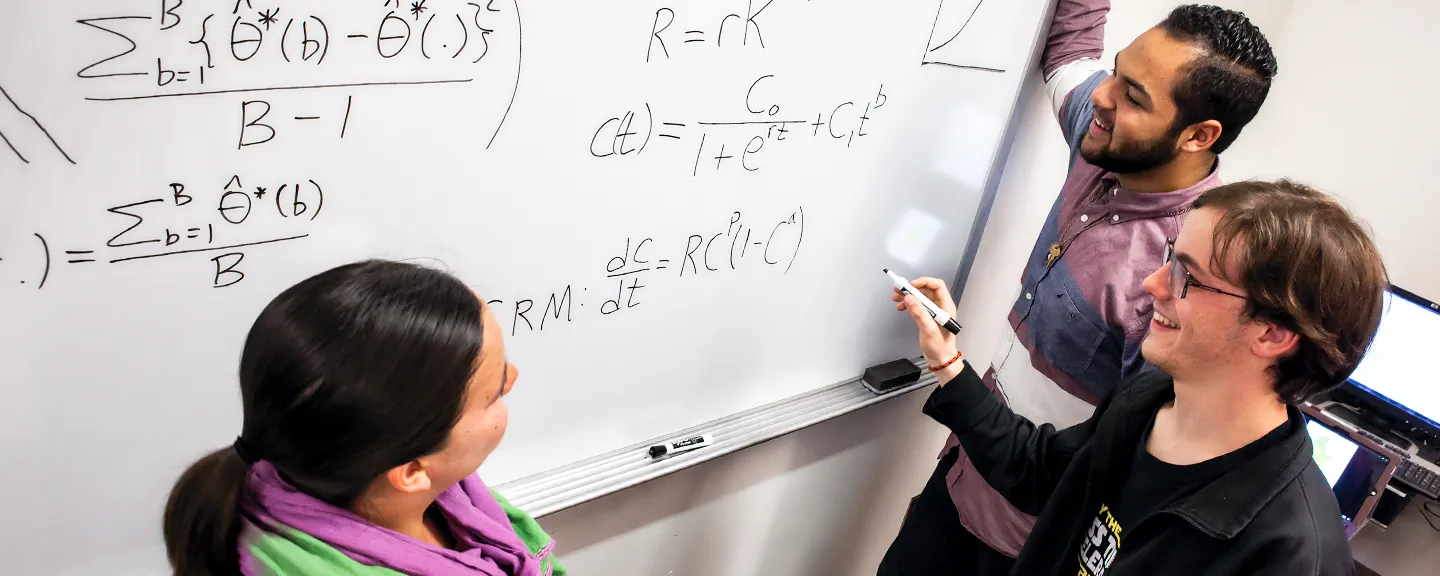- Home
- >
- APU Articles
- >
- News Article
The Difference Between Mathematics Degrees: Applied Math vs. Pure Math
May 27, 2021 | Written By Ashley Eneriz

This deeper look into the BS in Applied Mathematics program at Azusa Pacific University can help you see how it differs from a BS or BA in Mathematics, and if it’s the right choice for you.
What Is an Applied Mathematics Degree?
Edwin Ding, PhD, an associate professor in the Department of Mathematics, Physics, and Statistics at APU, noted that the mathematics major focuses on pure mathematics. He explained that pure mathematics deals with the theoretical side of math and has a greater concentration on proofs, theorems, and abstract concepts.
“The applied math major, on the other hand, focuses more on applying analytical/computational math techniques to solve real-world problems in different fields,” said Ding. These fields can include actuarial science, biology, physics, computer science, and statistics. According to Ding, “Both majors start with the foundational courses, such as calculus sequence and ordinary differential equations, and go into different specializations later on.”
Which Math Degree Is Right for You?
Before deciding which mathematics degree path you want to pursue, consider your interests and future career goals. Ask yourself why you want a degree in math.
Your answer can help you determine which math degree choice is a better fit for you. Ding noted that switching from math to applied math—and vice versa—is easy, as there’s overlap during the first few semesters, providing flexibility to students.
Ultimately, Ding recommended an applied mathematics degree for students who want to enter careers in actuarial science, data science, or data analytics, as the coursework focuses more on computational skills. Upon graduation, students can use their degree to pursue a range of interesting careers or work toward an MS in Applied Statistics and Analytics at APU.
Going above and beyond the Numbers with APU
Many universities offer mathematics degrees, and while you might not think coursework varies greatly, the school you choose can make a huge impact on your future in mathematics. APU offers small class sizes and a specialized three-course, discipline-specific writing sequence that merges faith and the math curriculum.
APU also customizes each track for a student’s different needs and career goals. For example, if a student wants to become an actuary, the actuarial science track prepares students for entry exams to become a chartered actuary. For students who want to pursue an MS in Applied Statistics and Analytics, APU’s 4+1 program allows them to receive both a bachelor’s and a master’s degree in just five years.
Ding also explained that APU consistently looks to expand and improve its offerings for students. “Our department is adopting innovative pedagogies and faith integration projects,” he said. “We also offer math fellowships—$3,000 per year for four years—to the top incoming freshmen to help optimize their APU experience.”
Ready to see how far an applied mathematics degree can take you? Download APU’s Applied Mathematics major brochure to see how the program helps prepare students to solve real-world problems.